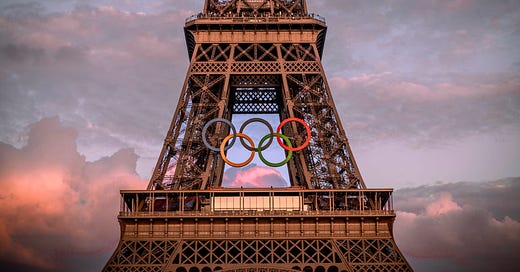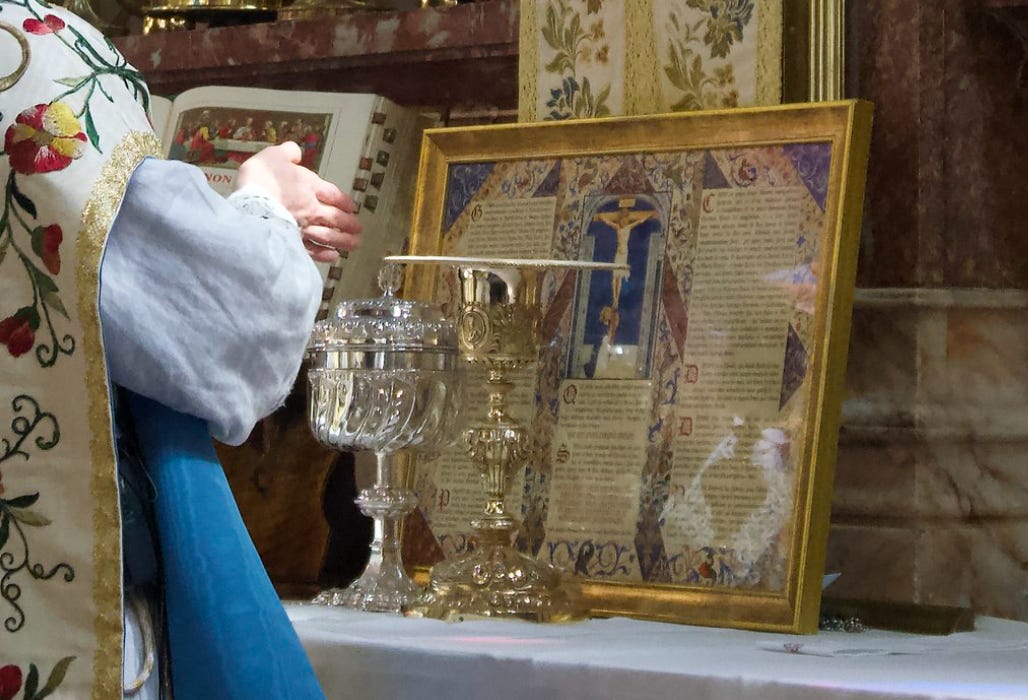Olympic ceremony sacrilege is a litmus test for US bishops
Calls by US bishops for prayers and fasting in response to the trans-mockery of the Last Supper at the Olympics are notable.
(PerMariam) — The “sacrilegious and vulgar” opening ceremony of the Paris 2024 Summer Olympics is serving as a litmus test for many U.S. bishops, fresh on the heels of their recently concluded Eucharistic Congress.
As few are likely unaware, the highly anticipated 2024 Olympics began in Paris on Friday with an opening ceremony that placed Catholicism as its chief target.
The brainchild of the openly homosexual man Thomas Jolly, the July 26 opening ceremony of the Olympics saw drag-queens and dancers in various stages of undress perform a mock imitation of the Last Supper. Images and footage of the show have, by now, filled many a digital screen and there is no need to reproduce them any further.
Outrage over the incident has been swift – a critical observer might even say somewhat surprisingly so – from Catholic bishops. Some have as expected been more vocal and more critical than others.
The French bishops issued a collective statement in which they noted how they “deeply regret” the “scenes of mockery and derision of Christianity.” The statement was perhaps more notable by the fact of its publication rather than by the force of its actual content.
But it has been many amongst the U.S. episcopate who have in fact expressed their consternation in a more direct manner. Indeed, with the Olympic ceremony taking place only days after the conclusion of the much vaulted Eucharistic Congress in the U.S., the timing of their interventions is key.
US bishops’ and the Congress
As already reported by many – including LifeSiteNews – the range of bishops across the U.S. reacting to the ceremony has been notable. A veteran of the media scene, Bishop Robert Barron was quick to condemn and issue subsequent condemnations of the Paris ceremony. Such was arguably hardly surprising, given his well-studied use of the media.
But the steadily increasing number of U.S. bishops who have protested the ceremony has been both encouraging and served to highlight the focus of the anti-Catholic message of the Olympic ceremony. It also puts into the spotlight the practical impact of the Eucharistic Congress which concluded only days before the Olympics began.
Tyler’s emeritus Bishop Joseph Strickland issued a characteristic strident statement of condemnation:
The bigotry toward Christians and the blasphemy of Jesus Christ, God’s Divine Son on display at the Olympics is a new low for our human community. Shame on those who produced this mockery, shame on the Olympic Committee and the nation of France for allowing it. This tarnishes what should be the noble celebration of sport and competition.
Madison’s Bishop Donald Hying was one of many who called for prayers and fasting.
Archbishop Salvatore Cordileone of San Francisco opined that “Secular fundamentalism has now infiltrated the Olympics, even to the point of blaspheming the religion of over a billion people. Would they do that with any other religion?”
He too asked for Catholics “to pray for a restoration of good will and respect.”
Oklahoma’s Archbishop Paul Coakley minced no words in his own, brief response:
I am saddened and sickened by the deplorable mockery of the Last Supper which was part of the Opening Ceremony at the Paris Olympics. It was a blatant attack on the Catholic Mass which we hold so sacred.
A number of the U.S. episcopate directly linked the Olympics to the U.S. Eucharistic Congress, noting the direct contradiction between the two. Allentown’s Bishop Alfred Schlert even suggested that “the enemy was not pleased,” with the Congress “and he chose the time of his evil response.”
“The sacrilegious response to our public worship of the Most Blessed Sacrament came quickly, at the Opening Ceremonies of the 2024 Paris Olympics,” wrote Schlert. “With one billion people watching, a horrendous depiction of the Last Supper, complete with a monstrous drag queen ‘Jesus’ and transvestite ‘apostles,’ was offered by the French Olympic organizers as their disdain and ridicule of the Christian faith.”
Indeed this connection between the Congress and the Olympic opening ceremony is crucial. For well-intentioned members of the U.S episcopate, the last few days with the Congress have been marked by calls for a Eucharistic revival. Bishops have been urging each other, their clergy, and their congregations to rekindle a devotion to Christ in the Blessed Sacrament.
One of the most notable examples of this was when Abp. Cordileone outlined a 10-point plan for cultivating a renewal of such devotion during the homily he delivered to a packed out traditional Mass at the Congress.
One of the justly made criticisms so often made about speeches at such mass-participation events is that – while often impassioned and captivating at the time – they can often be filled more with hot air than with substance. While rhetoric can be easy to deliver, practical and demonstrable results are often much harder, and it takes more to actually deliver a Eucharistic revival than simply speaking about it. Observers have also questioned the many millions spent on the Congress, and consequently queried the expected efficacy.
Such points are valid, since – as the experience of recent decades has shown – a number bishops have become more accustomed to given speeches than providing inspiring leadership.
Prayer and fasting make a return
But if the Eucharistic Congress is destined to be efficacious, then the bishops must respond to the Olympics opening ceremony by demonstrating the attention to the Eucharist which they called on their congregations to practice.
This, it seems, certain bishops are realizing.
Bishop Andrew Cozzens, Chairman of the Board of the National Eucharistic Congress, noted how it was just one week after the events of the Congress that the Olympic ceremony took place:
Just one week later, on July 26th in Paris, where the newly restored Cathedral of Notre Dame stands as an iconic reminder to our belief in the importance of the Mass, which makes spiritually present to us the Last Supper, nearly 1 billion men, women and children, in person and through live telecast, witnessed the public mockery of the Mass, the “source and summit of the Christian life” (LG, 11).
During the opening ceremonies of the Summer Olympics, the famous DaVinci Masterpiece The Last Supper was depicted in heinous fashion, leaving us in such shock, sorrow and righteous anger that words cannot describe it.
Brothers and sisters, we know that what the enemy intends for evil, God uses for good. We know that “where sin increased, grace overflowed all the more” (Rom 5:20).
Bp. Cozzens cited Scripture throughout his letter, calling for a renewed practice of Christ’s instruction of prayer and fasting to defeat the demons.
We believe that the Last Supper is united with the death of Christ on the Cross and, together with the Resurrection, these events are all one in the Paschal Mystery.
This passover, which begins at the Last Supper, is the most sacred moment in the life of Jesus. This is when Jesus offered his life for us so that we could share in his divine life forever.
Jesus experienced his Passion anew Friday night in Paris when his Last Supper was publicly defamed. As his living body, we are invited to enter into this moment of passion with him, this moment of public shame, mockery, and persecution. We do this through prayer and fasting.
And our greatest prayer—in season and out of season—is the Holy Sacrifice of the Mass.
As the Church throughout the world gathers tomorrow at the Lord’s Altar, let us do so with renewed zeal. Let us pray for healing and forgiveness for all those who participated in this mockery.
Prayer and fasting: it is rare for bishops nowadays to use such rhetoric, and even more rare for a number of them to do so. Yet here, days after the Eucharistic Congress concluded, bishops are calling for the traditional – and often ignored – customs of the Church in response to blasphemy, namely prayer and fasting.
“Let us commit ourselves this week to greater prayer and fasting in reparation for this sin,” Bp. Cozzens urged. “Perhaps you could attend Mass once more this week or do an extra holy hour?”
He also shied away from downplaying the “evil” of the ceremony – a ceremony dubbed by Cardinal Gerhard Müller as “sacrilegious and vulgar.” Continuing, Cozzens wrote:
Inspired by the many martyrs who shed their blood to witness to the truth of the Mass, we will not stand aside and quietly abide as the world mocks our greatest gift from the Lord Jesus. Rather, through our prayer and fasting, we will ask the Holy Spirit to strengthen us with the virtue of fortitude so that we may preach Christ—our Lord and Savior, truly present in the Eucharist—for the Glory of God and the Salvation of Souls.
These are striking words, but especially striking coming from the bishop who, for many thousands of U.S. Catholics, has become the face of the Eucharistic Congress. For many years concerned Catholics have been bereft at the lack of leadership from the hierarchy as scandal after scandal has rocked secular society and the Church Herself.
But for Bp. Cozzens and others to call Catholics to defend the Eucharist and to invoke the example of the martyrs in doing so, suggests that some prelates are beginning to realize that they will have to fight for the Catholic faith in order to preserve it for the next generation.
Bishop James Conley of Lincoln – whose diocese is home to the packed FSSP U.S. Seminary and whose own diocesan seminary is flourishing in numbers – also shared the sentiments expressed by Bp. Cozzens.
“The deplorable depiction of the Last Supper was not in any way artistic, but instead was a direct and blatant assault upon Christianity,” he wrote. “The Last Supper represents Jesus giving his Body and Blood for us in anticipation of his crucifixion. It is one of the greatest acts of love in the history of the world. Never should it be mocked and treated in such a way.”
For many years a shocking number of Eucharistic abuses have, and indeed continue, to be propagated. Silence has been the norm in the face of scenes similar to those seen in Paris last Friday. Indeed, the Holy See has maintained a stubborn silence over this very instance.
But now, as Providence has placed the Eucharistic Congress and the Olympics opening ceremony in such proximity, some of the U.S. episcopate have had the perfect opportunity to defend the Eucharist. They have apparently begun to turn back to the Church’s wealth of tradition, highlighted the example of the martyrs whose lives have so much to teach, and drawn from the tried and tested means of spiritual warfare which has nourished the Church throughout the centuries.
Should they continue to do so, should they continue to lead their flock in prayers, fasting and acts of reparation, then the Eucharistic Congress and even the Olympic ceremony might indeed be described as an occasion of grace for the Church.








